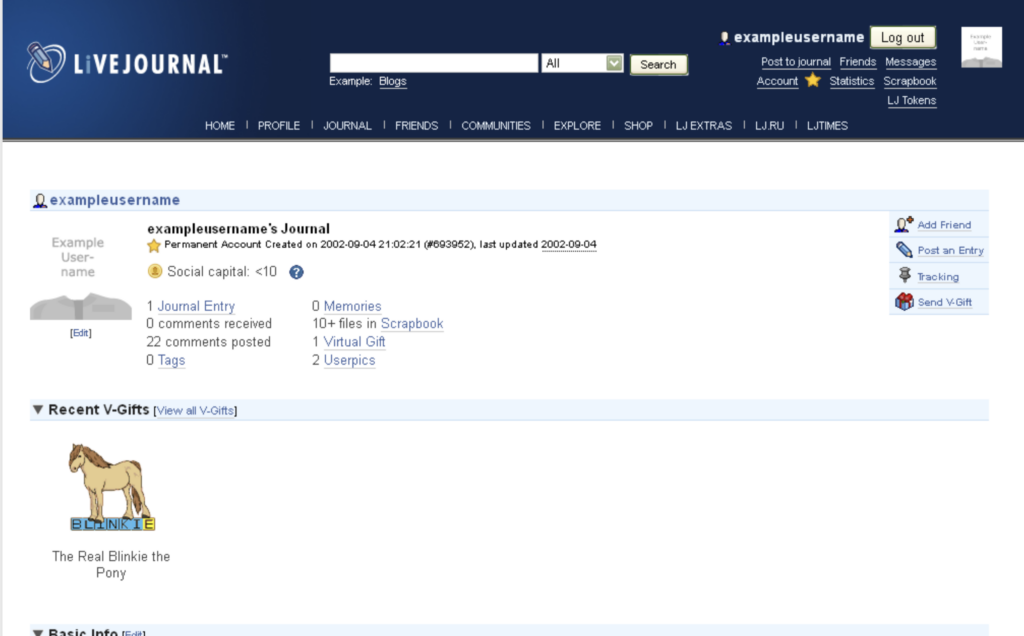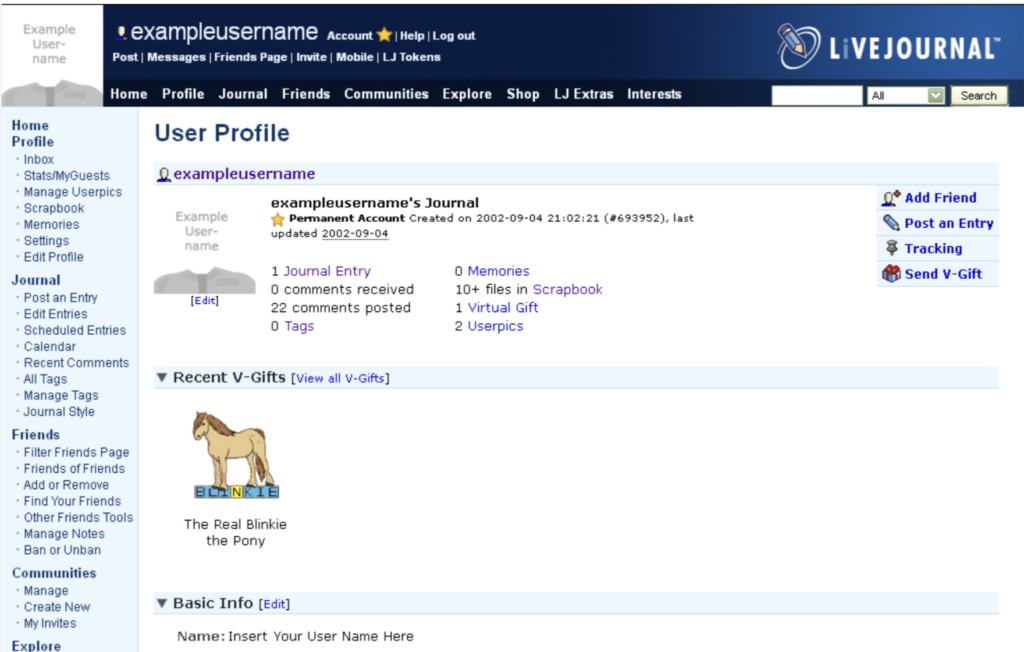Exploring the History and Future of LiveJournal: Blurring the Lines Between Blogging and Social Networking
In the digital age, finding a space that melds personal expression with community connection can be challenging. Enter LiveJournal, a pioneer in intertwining blogging with social networking since 1999.
This article will unveil the rich tapestry of LiveJournal’s past, examine its present state, and peer into what the future holds for this online journaling giant. Get ready to dive into a world where diary entries meet digital communities!
Key Takeaways
- LiveJournal started as a unique platform in 1999, combining the personal aspect of diary entries with the communal feel of social networks.
- The platform experienced ownership changes, being acquired by Six Apart in 2005 and later SUP Media; these shifts influenced its features and user experience.
- Communities within LiveJournal play a vital role, allowing users to engage deeply through group journals and discussions on shared interests.
- Privacy settings on LiveJournal empower users to control who sees their content, but server relocation to Russia has raised concerns about censorship and data privacy.
- Despite declines in its user base amidst growing competition from other social media sites, LiveJournal maintains a dedicated following that appreciates its blending of blogging with community interaction.
Understanding LiveJournal
LiveJournal, a unique blend of blogging and social networking, offers users the ability to create online journals with community interaction while maintaining privacy and content control.
LiveJournal was founded in 1999 by Brad Fitzpatrick and later acquired by Six Apart in 2005. It gained popularity for its community features and personal diary-style blogging. LiveJournal has a strong user base in Russia due to its popularity among Russian-speaking users.
The platform has seen a decline in users since its peak in the mid-2000s, but it continues to have a dedicated user base and remains an important part of the history of blogging and social networking.
With its distinct features, it has carved a niche for itself in the digital world.
Unique Features of LiveJournal
LiveJournal sets itself apart from other blogging platforms with its blend of social networking tools and customizable features. Paid account holders enjoy added perks such as advanced design customization options, creating a space that truly reflects their personal style.
Not limited to the look and feel, users can also manage their content visibility with fine-tuned privacy settings.
The platform stands out for accepting adult content under meticulous guidelines, catering to a diverse range of expressions while maintaining community standards. With its considerable popularity in Russia, LiveJournal’s user base contributes to a unique cultural tapestry that shapes its character among social media channels.
This approach fosters an environment where blogging transcends mere diary entries and becomes an interactive experience – all thanks to these distinctive elements that encourage connection and creativity across borders.

(Image Credit: LiveJournal)
Community Interaction
LiveJournal transformed digital interaction by introducing group journals known as “communities.” These communities fostered unique roles for individuals: owners set the tone, maintainers, and moderators upheld community guidelines, members engaged in vibrant discussions, and watchers observed the unfolding narratives.
This structure paved the way for dynamic online societies where every voice could contribute to a larger dialogue.
The platform gained special significance in Russia, evolving into an indispensable social networking tool under its alias ZheZhe. Russian users leveraged LiveJournal’s US-based servers to create spaces of free expression, sharing dissenting opinions far from the reach of local censorship laws.
The relocation of these servers to Russia marked a significant shift – suddenly, this bastion of free speech fell under stringent regulations that threatened both user privacy and open discourse.

(Image Credit: LiveJournal)
Privacy and Content Control
As we delve deeper into the fabric of digital diaries, controlling access to personal musings becomes crucial. LiveJournal takes this seriously with robust privacy settings that allow users to fine-tune their audience.
You have the power to mark blog entries as public or private, ensuring sensitive content is shared only with those you trust. Furthermore, comment control features let you decide not just who can respond to your posts but also how these comments are managed and displayed.
Tackling more sensitive themes, LiveJournal’s “friends only” setting offers an additional layer of intimacy for your writings. Creating custom user groups tailors your sharing circle even tighter, giving peace of mind when discussing personal matters.
Meanwhile, adult content has its place on the platform but comes with a clear mandate: label it properly to maintain a safe environment for all ages. It reflects a dynamic balance between expression and responsibility—an ongoing commitment as seen by evolving security options after past account security incidents.
LiveJournal’s History
LiveJournal’s history is a complex tapestry of growth, change, and controversy. From its founding in 1999 to its sale to Six Apart and SUP Media, the platform has been at the center of numerous key controversies and criticisms over the years.
Founding and Early Years
Brad Fitzpatrick established LiveJournal in 1999, setting the stage for its initial growth and community building. During its inception and formative years, the platform’s personal diary-style blogging quickly gained popularity among users.
As LiveJournal entered its early phase, it offered a unique space for individuals to connect with others through their online journals, marking the genesis of what would become a vibrant digital community.
The platform saw significant milestones during its early establishment, creating an environment where users could share their thoughts and experiences while engaging with fellow journal writers.
Sale to Six Apart and SUP Media
After its initial founding and early years, LiveJournal underwent a significant change in ownership in 2005. The platform was acquired by Six Apart, marking a pivotal moment in its history.
This transaction had substantial implications for the future direction of LiveJournal and introduced new dynamics to its development as a social networking and blogging platform. The acquisition brought about changes to the company’s leadership, strategic vision, and user experience.
Following this acquisition, further developments occurred with SUP Media taking over LiveJournal at a later date. These transitions in ownership have impacted how LiveJournal has evolved over time, influencing the platform’s features, community engagement, and overall position within the online landscape.
Key Controversies and Criticisms
LiveJournal has been marred by several controversies over the years, particularly related to ownership changes and censorship concerns. Notably, its servers were relocated from California to Russia in 2016, subjecting it to Russian state requests for user data and leading to censorship and prosecution of dissenting opinions.
In April 2017, LiveJournal eliminated the ability of paid contributors to prevent ads being shown to their readers. The platform also faced criticism over its invite system, usage of the word “friends,” and decisions made by the Abuse Prevention Team.
Additionally, LiveJournal’s stance on ad placement has fueled dissatisfaction among users. The elimination of options for paid contributors to control ad displays stirred discontent in the community.
Notable LiveJournals and Users
Several LiveJournals and users have left a significant mark on the platform’s history. One such notable user is Bruce Sterling, an influential science fiction writer who used LiveJournal as a medium to engage with his fan base.
Another prominent figure is Mark Frauenfelder, co-founder of Boing Boing, a popular group blog that gained widespread recognition through its association with LiveJournal. Their contributions reflect the diverse and impactful nature of LiveJournal within the blogging community.
Furthermore, communities like “Oh No They Didn’t!” have garnered attention for their large followings and active participation, showcasing how LiveJournal continues to foster vibrant user engagement.
These instances demonstrate the platform’s ability to cultivate meaningful connections among its users while shaping online discourse in unique ways.
LiveJournal’s Impact on Blogging and Social Networking
LiveJournal has played a significant role in blurring the lines between traditional blogging and social networking, creating a unique platform that fosters community interaction and content sharing.
Its influence on global communities of bloggers has reshaped the way individuals connect and share their thoughts and experiences online.

(Image Credit: LiveJournal)
Blurring the Lines Between Journaling and Networking
Blurring the lines between traditional journaling and networking, LiveJournal has transformed online self-expression into a communal experience. Users can share personal reflections while engaging with a global community of like-minded individuals, blurring the boundaries between diary-style blogging and social media networking.
This integration of personal content creation with interactive features has redefined the way individuals connect and communicate in digital spaces.
LiveJournal’s impact on blogging and social networking is evident through its unique combination of user-generated content and community engagement, shaping the platform as more than just a blogging site but also as a virtual meeting ground for diverse perspectives and experiences.
Influence on Global Communities of Bloggers
LiveJournal’s impact on global communities of bloggers has been significant, blurring the lines between personal journaling and social networking. The platform’s unique community features have fostered user engagement and connectivity among online diarists from diverse cultural backgrounds.
Particularly notable is its popularity among Russian-speaking bloggers, contributing to the platform’s role in uniting a wide array of voices in the digital sphere. However, LiveJournal has also faced controversies over censorship and ownership changes that have influenced its standing within the blogging history and online social ecosystem.
The evolution of LiveJournal continues to shape the landscape of personal blogging and social media interactions, reflecting both historical significance and contemporary challenges.
As technology advances continue to reshape how individuals connect with their peers through digital platforms, it remains essential to examine LiveJournal’s role as a formative force in engaging global communities of bloggers.

Current Status and Future Prospects of LiveJournal
LiveJournal continues to attract a diverse user base, with a strong presence in Russia and the former Soviet Union countries. However, it faces challenges in maintaining relevance amidst competition from newer social media platforms.
The future prospects of LiveJournal may lie in its ability to adapt and innovate, catering to the evolving needs of online communities.
Current User Demographics
LiveJournal’s current user demographics reflect a diverse community of online journaling enthusiasts. The platform offers various account tiers, including basic, plus, “early adopters”, paid, and permanent options.
Although LiveJournal has experienced a decline in its user base since its peak in the mid-2000s, it still retains a dedicated following of long-term users who value the platform for its unique blend of blogging and social networking features.
User profiles on LiveJournal serve as personal diaries for individuals to express themselves and engage with others within the community. Community engagement remains an essential aspect of LiveJournal’s appeal, allowing users to connect with like-minded individuals through shared interests and experiences.
Potential Future Developments
User security may face heightened threats as LiveJournal continues to evolve. Cybersecurity concerns and potential data breaches could put user accounts at risk, necessitating an increased focus on platform regulations and account security.
Additionally, the platform might encounter further challenges regarding content moderation and privacy control, as well as legal cases involving freedom of speech and online censorship.
The future prospects of LiveJournal remain uncertain in light of these potential developments.
The relocation to Russia has opened up new possibilities for censorship involvement with implications for the global community of users. Future changes in terms of service violations handling or content moderation could significantly impact user experience.
Legal Cases and Censorship Involving LiveJournal
Legal cases and censorship have been a significant issue for LiveJournal, with lawsuits against bloggers and controversy surrounding its Russian jurisdiction. Understanding these legal challenges is crucial to grasping the platform’s complex history and ongoing debates about freedom of expression in online communities.
Lawsuits against Bloggers
In 2007, LiveJournal was embroiled in a legal battle with bloggers over the decisions made by its Abuse Prevention Team to handle violations of the Terms of Service. The leaked policy document used by the team sparked further legal action from users, highlighting tense interactions between blog authors and platform administrators.
Additionally, LiveJournal faced criticism and potential legal ramifications due to controversial decisions such as removing default user pictures containing images of breastfeeding and introducing a new user type, Sponsored+ (later renamed to Plus), which led to considerable controversy and potential lawsuits.
These lawsuits against bloggers signify a critical point in the platform’s history, raising important conversations about online content moderation and enforcement policies. The legal disputes serve as an essential part of understanding LiveJournal’s impact on the blogging community and shaping future discussions around user-generated content regulations.
LiveJournal Blocking and Russian Jurisdiction
In 2007, LiveJournal changed hands when it was purchased by Russian media company SUP Media. This transfer of ownership led to concerns about the platform’s adherence to international standards and freedom of speech guarantees.
In 2016, LiveJournal took another big step as its servers were relocated to Russia, sparking worries over potential government intervention and internet censorship issues due to Russian jurisdiction.
The relocation has brought about access restrictions in several countries, with LiveJournal being outright blocked in places like China, Kazakhstan, and Uzbekistan.
The legal ramifications of moving the servers have raised questions about content moderation and whether LiveJournal can uphold freedom of expression in light of differing international jurisdictions.
Government authorities’ ability to intervene could impact users’ online interactions and pose challenges for navigating an increasingly interconnected digital world.
Conclusion
LiveJournal has evolved from a personal diary platform to a space where online journaling and social networking converge, influencing global communities of bloggers. With its history marked by controversies and ownership changes, LiveJournal continues to raise concerns about censorship and government control following its server relocation to Russia.
Despite facing challenges, LiveJournal’s impact on digital networking is undeniable, with its innovative features shaping the landscape of blogging platforms. As we delve into the future, it remains crucial to monitor how LiveJournal navigates legal cases and censorship issues while maintaining its position in the ever-changing realm of social media.
Frequently Asked Questions
What is LiveJournal used for?
LiveJournal is a social media platform that combines elements of blogging and online journaling, allowing users to share their thoughts, experiences, and interests with a community of readers.
How has LiveJournal influenced the landscape of social networking?
LiveJournal has played a significant role in shaping the early days of online communities by fostering personal connections, creating spaces for niche interest groups, and pioneering features like friend lists and user comments.
Can I still use LiveJournal today?
Yes, you can still use LiveJournal as it continues to be an active platform for blogging and interacting with other users who share similar interests.
What distinguishes LiveJournal from other social networking platforms?
LiveJournal stands out due to its emphasis on long-form content, privacy control options, customizable user profiles, and vibrant sense of community among its users.
How might LiveJournal evolve in the future?
The future trajectory of LiveJournal may involve integrating modern features such as multimedia sharing options or adapting to changing trends in digital communication while preserving its essence as a distinct blend of blogging and social networking.







One Comment
Comments are closed.